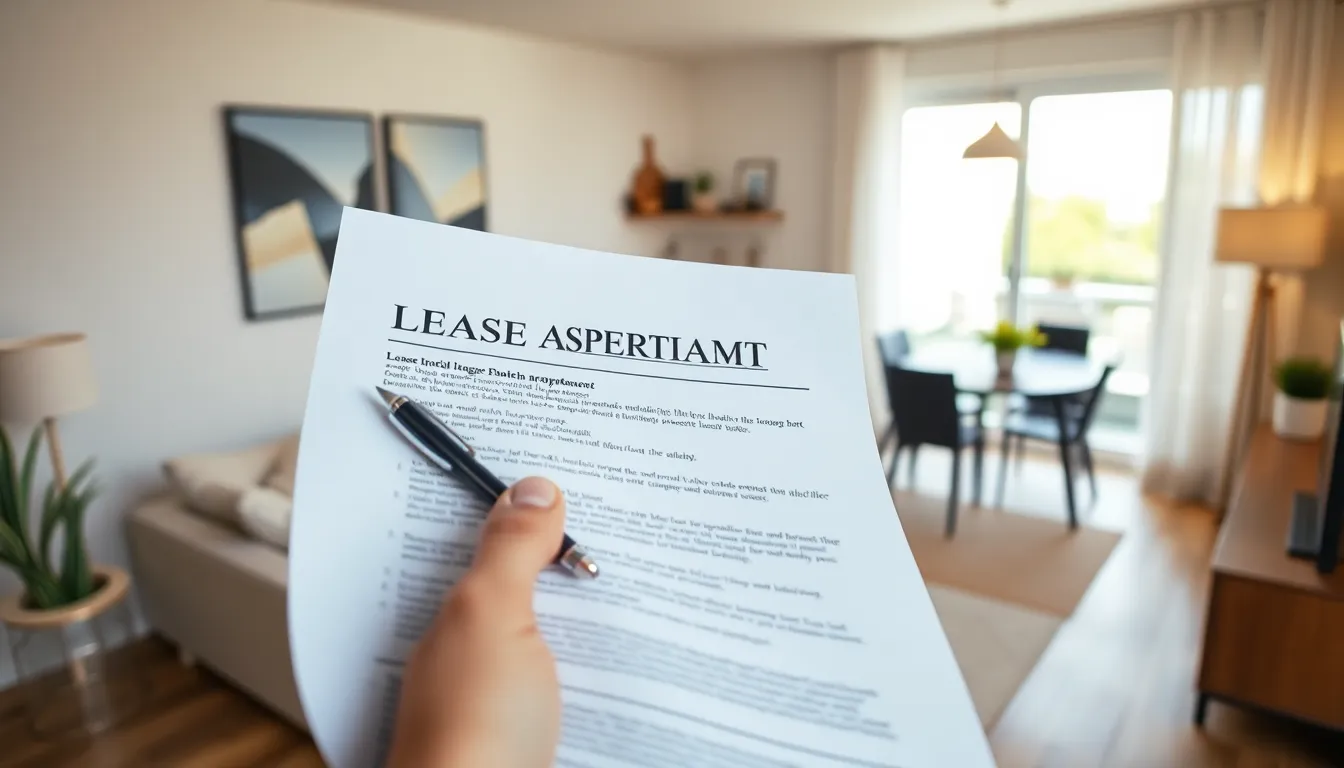Navigating the world of rental deposits can feel like stepping into a game of Monopoly—one minute you’re rolling in cash, and the next, you’re trying to avoid landing on Boardwalk with a hotel. These deposits, often seen as a necessary evil, serve as a safety net for landlords while leaving tenants scratching their heads about what’s fair and what’s not.
Table of Contents
ToggleUnderstanding Rental Deposits
Rental deposits play a crucial role in the rental process, serving as a security measure for landlords while also raising questions for tenants regarding their fairness. It’s important to grasp the details surrounding these deposits.
Definition of Rental Deposits
A rental deposit, often referred to as a security deposit, is a sum of money collected by the landlord before a tenant moves in. This sum serves as financial protection against potential damages or unpaid rent. Typically, the amount equals one month’s rent, although variations exist based on location and property value. Landlords hold this money in escrow and return it upon tenancy termination, contingent upon the property’s condition.
Purpose of Rental Deposits
The purpose of a rental deposit aligns closely with property protection. Landlords secure coverage for any damages that occur during a tenant’s stay. This deposit also enables the landlord to recoup unpaid rent costs, should the tenant fail to satisfy their obligations. Moreover, rental deposits encourage tenants to maintain the property’s condition, as their ability to retrieve the deposit hinges on meeting certain standards. Overall, this financial arrangement creates a level of accountability for both parties involved in the rental agreement.
Types of Rental Deposits
Rental deposits can take several forms, each serving distinct purposes for both landlords and tenants.
Security Deposits
Security deposits represent the most common type of rental deposit. These funds act as financial protection for landlords against damages or unpaid rent. Typically, landlords require a security deposit equal to one month’s rent. Upon lease termination, landlords assess the property’s condition. If no damages occur, they return the full deposit. However, deductions may apply if repairs or cleaning are necessary. Understanding security deposit laws in specific states ensures compliance and clarity.
Pet Deposits
Pet deposits specifically relate to tenants with pets. Landlords often charge this additional fee to cover potential damages caused by animals. The amount varies, but it usually ranges between $150 and $500. This additional financial requirement incentivizes pet owners to maintain the property. Like security deposits, pet deposits may be refundable after assessing any pet-related damages. Clear communication about pet policies can prevent misunderstandings.
Advance Rent Deposits
Advance rent deposits involve upfront payment of rent for a specified period, often the first and last month’s rent. This deposit acts as a commitment from tenants, securing their tenancy. It reduces the landlord’s risk of unpaid rent. Often, this arrangement includes provisions indicating how the advance payments will apply to future rent. Understanding the implications of advance rent deposits can aid tenants in managing their financial commitments better.
Legal Aspects of Rental Deposits
Understanding the legal landscape of rental deposits is vital for both landlords and tenants. Laws regarding these deposits can vary significantly by state, impacting how they must be managed and returned.
State Regulations
State regulations determine the amount landlords can charge for rental deposits. Most states permit a deposit equivalent to one month’s rent. Some states require landlords to place deposits in interest-bearing accounts, ensuring tenants receive interest upon return. Deadlines for returning deposits also vary; many states mandate landlords return deposits within 30 days after tenancy termination, barring valid deductions. Familiarity with local laws helps prevent disputes and ensures compliance.
Tenant Rights and Responsibilities
Tenants possess rights to fair treatment regarding their rental deposits. They should receive written notice detailing any deductions necessary for repairs or cleaning after vacating. Additionally, tenants hold the right to dispute unjustified deductions and request a return of their deposit. Responsibilities include keeping the rental unit in good condition, which impacts the deposit’s return. Not adhering to lease terms can lead to financial penalties or forfeiture of the deposit, underscoring the need for clear communication between parties.
Management of Rental Deposits
Managing rental deposits involves clear procedures for both collection and return. Establishing transparency ensures a smoother experience for landlords and tenants alike.
How to Collect Rental Deposits
Collect rental deposits upfront before the tenant moves in. Demand a written lease agreement detailing the deposit amount, typically equivalent to one month’s rent. Accept payment methods such as checks or electronic transfers for convenience. Ensure that the tenant receives a receipt confirming the deposit’s amount and purpose. Provide information about where the deposit will be held, whether in a separate escrow account or an interest-bearing account, to promote trust and compliance with state regulations.
Best Practices for Returning Rental Deposits
Returning rental deposits requires meticulous attention to detail. Document the property’s condition thoroughly before the tenant moves out, using photographs for reference. Notify tenants in writing of any deductions from the deposit, outlining reasons for each charge. Adhere to state-specific timelines for returning deposits, ensuring payments occur swiftly, often within 30 days after move-out. Communicate clearly with tenants to resolve disputes and foster goodwill, enhancing the overall rental experience and minimizing potential conflicts.
Common Issues with Rental Deposits
Rental deposits often lead to misunderstandings and conflicts between landlords and tenants. Common issues stem from disagreements about deductions and how deposits are managed.
Disputes Over Deductions
Disputes frequently arise when tenants receive deductions from their rental deposits. Landlords must provide clear evidence for any charges, such as receipts for repairs or cleaning. Tenants may question the validity of these deductions, especially if claims appear exaggerated or unjustified. To avoid disputes, detailed move-in and move-out checklists are beneficial for both parties. Clear communication surrounding property conditions at both stages lessens the chances of misunderstandings.
Tips for Avoiding Rental Deposit Conflicts
Avoiding conflicts over rental deposits requires proactive measures. Landlords should establish clear written agreements outlining deposit terms and conditions. Documenting the property’s condition thoroughly during move-in minimizes potential disagreements later. Providing tenants with receipts for each deposit collected fosters transparency and trust. Encouraging open discussions about expectations regarding deductions creates a more cooperative environment. Additionally, understanding state regulations can ensure compliance, allowing both parties to navigate rental deposits smoothly.
Conclusion
Navigating rental deposits requires a clear understanding of both legal obligations and the responsibilities of landlords and tenants. By fostering open communication and adhering to state regulations, both parties can minimize disputes and ensure a fair rental experience. Establishing detailed agreements and documenting property conditions can significantly reduce misunderstandings.
Ultimately, rental deposits play a crucial role in protecting the interests of landlords while encouraging tenants to maintain the property. With the right knowledge and practices in place, both landlords and tenants can approach rental agreements with confidence and clarity.



